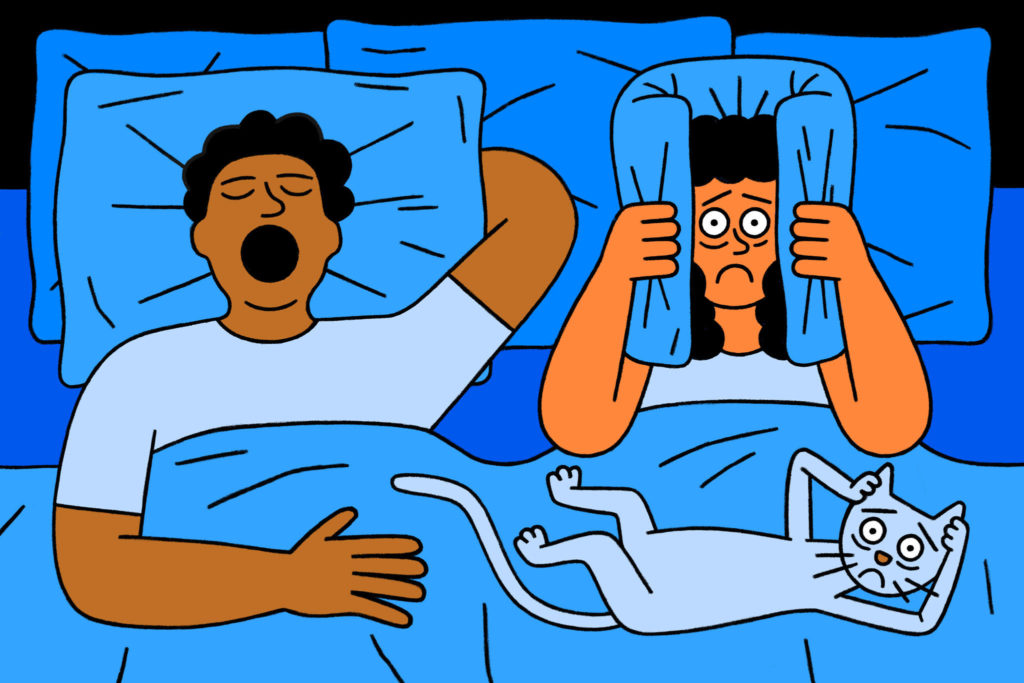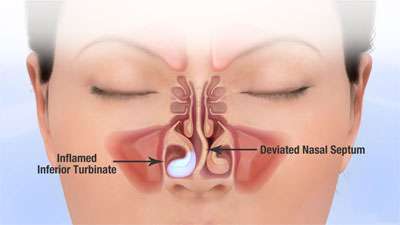Snoring: Is My Nose Blocked Or Something Worse?

It might be you or your spouse who keeps on snoring but have you ever wondered why? Is the persistent loud snoring something to worry about? Can you just blame your snoring on having a blocked nose or is it something more sinister lurking beneath the loud snoring noise? Read on and find out why it is important to sort out your blocked nose, snoring and/or other airway-related breathing problems during your sleep.
At our ENT clinics in Singapore, our top ENT specialists in Singapore see and treat many patients who suffer from loud snoring, that may not only be due to having a blocked congested nose, but also due to airway collapse during sleep i.e. a more dangerous health condition called Obstructive Sleep Apnea, which we will explain in more detail soon. Frankly, having a persistently blocked nose and not being able to breathe clearly through your nose is ABNORMAL! Unfortunately, many people have suffered from blocked nose symptoms for so long that they have (wrongly) assumed that this is “normal” and have long forgotten what it should feel like to be able to breathe clearly and properly through their nose! Your mouth is certainly not designed to have you breathing mainly through it all the time. In fact, people who are mouth-breathers often complain of a dry mouth and throat discomfort.
Let’s talk about blocked nose problems first: The main reasons for a persistently blocked nose in Singapore are 1) Deviated Nasal Septum (crooked nasal bones inside) and 2) Enlarged turbinates (soft tissue swelling inside your nose) (see Figure 1). A blocked nose can cause noisy breathing and snoring problems but please take note, that often this may not be the only cause of persistent snoring. Having a deviated nasal septum is usually developmental i.e. how your nasal bones grow in your teenage years, but it might also be related to having had a traumatic injury from e.g. playing sports. Comparatively, the turbinates, which are sausage-shaped structures, one in each nasal passage, tend to swell up to cause nasal congestion, if there is a sinus infection or more commonly, nasal allergies (allergic rhinitis).

So both septum and turbinate factors act together to reduce the size of your nasal passages, making it more difficult for air to enter your nose. Some people may find it gets worse when they lie down as blood flows towards the back of the nose due to gravity, causing further enlargement of their turbinate tissue. Other people experience more nasal congestion when they exercise as once again, more blood is directed towards the inside of the nose during physical exertion. In the current Covid situation where everyone now has to wear a facemask outdoors, this can irritate the nose further and many people find it more difficult to breathe clearly through their already sensitive nose.
But the nose itself cannot always be blamed for persistent loud snoring symptoms, especially if there are other associated symptoms such as noisy breathing, gasping, choking, grunting, and nocturnal waking events. Daytime tiredness, recurrent headaches in the morning and general malaise with memory issues are also the result of poor quality sleep due to Obstructive Sleep Apnea (OSA). This can eventually lead to poor performance at work and school because we now know how important a good night’s sleep actually is for your physical and mental health.
So what should you look out for? Here are the danger signs of breathing difficulties when asleep, linked to poor oxygen intake from underlying airway obstruction in your sleep:
- Persistent loud snoring
- Recurrent gasping or choking noises
- Waking episodes in the middle of the night
- Feeling of not being able to breathe properly/suffocation sensation
- Restless sleep e.g. tossing and turning
- Sudden pauses or silences in breathing (usually noticed by your sleep partner)
- Daytime fatigue/tiredness (this can be dangerous as you can fall asleep while driving)
- Memory and concentration lapses
- Micro-sleep episodes (falling asleep without even realising it!)
- Poor temperament and mood swings (feeling grumpier then usual)
- Morning headaches (which gradually ease off after waking up)
If you do suffer from breathing problems when asleep due to obstructive sleep apnea (OSA), your airways keep on collapsing and closing off to affect the oxygen supply entering your airways to your lungs. In the longterm, if this goes undiagnosed and untreated, there is a higher risk of developing heart disease and heart attacks, suffering strokes, irregular heart rhythms (arrhythmias) which can lead to sudden death, high blood pressure and poor blood glucose/sugar control. Studies also show that obstructive sleep apnea may worsen the outcome of other health conditions which you may already suffer from, such as lung disease and diabetes. Attention deficits, behavioural and mental health issues, with memory problems, may repeatedly occur due to poor sleep quality from sleep apnea (OSA). Eventually, all these factors accumulate to lead to a higher risk of developing cognitive issues such as dementia, perhaps at a younger age than in people who do not have sleep apnea.
In conclusion, snoring is a sign of partial airway obstruction when you are asleep. It can be caused by a blocked nose and breathing through a blocked nose is not normal. Snoring may not always be due to “just a blocked nose” but other levels of airway obstruction like the throat and tongue base may also be contributing to the whole airway and snoring problem. Seek help from a top ENT specialist in Singapore before it worsens to an advanced stage with potential serious complications for your health!
Share this blog via:


